TL;DR: AI Voice Agents Basics [2026]
AI voice agents are transforming business communication by delivering fast, intelligent, and personalized voice interactions without human effort. Powered by speech recognition, NLP, and LLMs, these agents automate everything from customer support and appointment booking to sales outreach and fraud detection. In 2026, they’re widely used across industries like healthcare, finance, e-commerce, logistics, and travel. Unlike traditional IVR systems, modern voice agents are multilingual, omnichannel, proactive, and capable of real-time learning.
As voice becomes the preferred user interface, customers increasingly favor AI voice assistants for their speed, accuracy, and natural, human-like conversations. Whether you are a startup or enterprise, tools like Robylon make it easy to launch voice AI experiences that scale with your business
Introduction: The Rise of AI Voice Agents in Business
AI voice agents are revolutionizing the way businesses communicate with customers. Powered by technologies, these intelligent systems enable natural, real-time conversations without the need for human intervention. Whether it's answering customer queries, managing bookings, or processing transactions, AI-powered voice assistants are enhancing operational efficiency while delivering faster, more personalized support.
As companies increasingly prioritize automation and scalability, voice AI technology is becoming a vital tool across industries; from call centers and healthcare to e-commerce and finance. These virtual voice agents offer 24/7 availability, understand nuanced requests, and adapt to customer needs, making them an essential part of the modern customer experience strategy.
Keep your stack in sync. Book a demo to know more.
What Are AI Voice Agents?

AI voice agents are intelligent, voice-enabled software systems designed to understand, interpret, and respond to human speech in real time. They form the backbone of a wide array of voice AI chatbot solutions, operating across channels like phone calls, smart speakers, mobile apps, and IVR systems. Whether you're booking appointments, checking your bank balance, or resolving customer support queries, AI voice assistants handle these tasks autonomously, with human-like precision and tone.
Use Voice Agents to route, deflect, and summarize every call.
How Do AI Voice Agents Work?
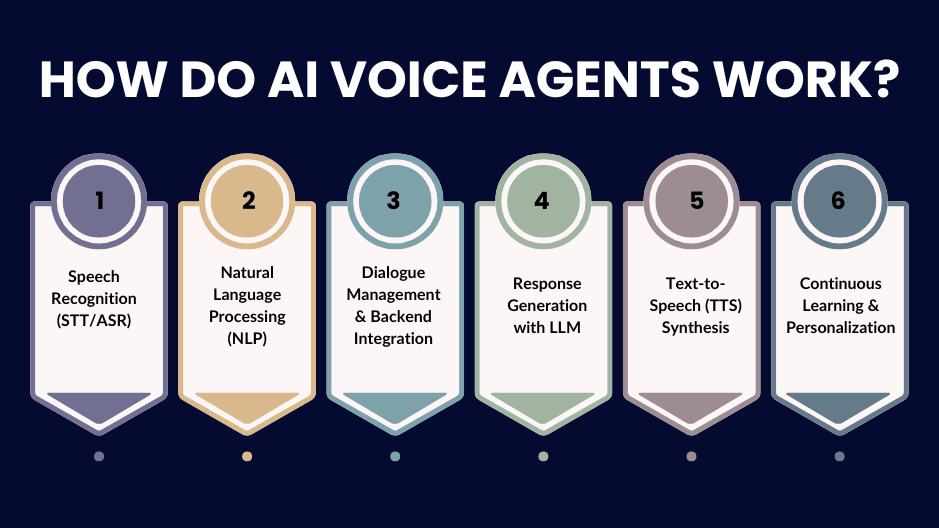
AI voice agents combine multiple advanced technologies to have real-time, intelligent conversations with users. Here is how the system works step by step
1. Speech Recognition (STT/ASR)
The interaction begins when a user speaks into a device like a smartphone or a call center line.
- The voice input is captured and converted into text using Automatic Speech Recognition (ASR), also known as speech-to-text (STT).
- This system detects spoken words, filters background noise, and handles different accents or speech patterns.
- Modern ASR models like OpenAI Whisper or Google ASR deliver high transcription accuracy.
2. Natural Language Processing (NLP)
Once the speech is transcribed, the system uses Natural Language Processing (NLP) to understand the user’s message.
- NLP helps identify intent, context, and key information (like time, location, account number).
- For example, “Can I reschedule my delivery to Friday?” → NLP detects intent: reschedule delivery, and entity: Friday.
- This is a core function of natural language processing voice agents, enabling contextual understanding.
3. Dialogue Management & Backend Integration
After understanding the user’s intent, the AI decides how to respond or take action.
- It analyzes previous interactions, current context, and business rules.
- The voice agent can connect to backend tools like CRMs, scheduling systems, or payment gateways.
- For deeper tasks, retrieval-augmented generation (RAG) or APIs help the agent fetch and process external data in real-time.
4. Response Generation with LLMs
Once the task is processed, a Large Language Model (LLM) generates a natural, informative response.
- The model crafts replies that are grammatically correct, context-aware, and personalized.
- Example: “Your package will be delivered on Friday at 4 PM.”
5. Text-to-Speech (TTS) Synthesis
Now, the text response needs to be spoken back to the user.
- This is where Text-to-Speech (TTS) technology comes in.
- It converts the text into human-like speech using deep learning models.
- Modern TTS systems adjust intonation, tone, and emotion to sound more natural and engaging.
6. Continuous Learning & Personalization
AI voice agents get smarter over time through machine learning.
- They learn from past conversations to reduce errors and improve accuracy.
- The system adapts to user behavior, preferred language, and speaking style.
- Some agents also support voice biometrics for security and personalization.
AI voice agents function as a seamless pipeline: Listen → Understand → Decide → Respond, delivering scalable, human-like voice interactions. By combining ASR, NLP, LLMs, and TTS, businesses can now deploy powerful, always-on voice agents for customer service, operations, and more.
How AI Voice Agents Improve Operational Efficiency and Customer Engagement
As customer expectations for speed, convenience, and personalization grow, businesses must modernize their support operations. AI voice agents do more than just handle basic interactions, they fundamentally improve both backend efficiency and customer-facing experiences. Here's how
1. Seamless Integration Across Channels
Modern AI voice agents are not limited to standalone IVR systems. They integrate effortlessly with CRMs, helpdesk platforms, and order management systems, ensuring real-time access to customer data during voice interactions. This enables them to
- Fetch and update customer information on the fly
- Initiate follow-ups via SMS, email, or chat based on user preferences
- Provide a unified experience across voice and digital channels
For example, an AI voice agent for an e-commerce brand can automatically track packages, initiate refunds, or switch channels mid-conversation if a user prefers a follow-up via WhatsApp.
2. Real-Time Context Retention and Handoff
When a customer query exceeds the scope of an AI voice agent, it doesn't just drop the conversation. It retains full conversational context and passes it on to a human agent complete with user profile, conversation history, and issue summary. This leads to
- Faster resolution without repeated explanations
- Reduced frustration due to smoother transitions
- Increased productivity of human agents through context-aware assistance
3. Intent Recognition and Adaptive Responses
Advanced AI voice agents use Natural Language Understanding (NLU) to interpret the intent behind spoken words; not just keywords. They continuously adapt based on user tone, sentiment, and conversation flow. As a result, they
- Understand complex, multi-intent queries in a single utterance
- Respond empathetically, especially in sensitive scenarios
- Guide users conversationally, improving the quality of self-service
This makes them ideal for sectors like healthcare, insurance, or travel, where user intent can vary widely and emotional tone matters.
4. Voice Biometrics and Authentication
Security is a growing concern in voice-based systems. AI voice agents now incorporate voice biometrics to verify user identity with high accuracy. This enhances
- Fraud prevention through passive, continuous voice verification
- Faster user authentication without needing to remember PINs or answer security questions
- Secure access to sensitive data like account balances or medical records
Voice-based verification also ensures compliance with modern data privacy standards without compromising user experience.
5. Proactive Communication Capabilities
AI voice agents are not just reactive, they can initiate outbound calls or reminders based on business triggers. This allows businesses to
- Automate appointment confirmations or reminders
- Follow up on pending actions like cart abandonment or incomplete forms
- Alert users about service outages, renewals, or policy updates
This proactive functionality helps reduce no-shows, improve conversions, and boost customer retention, without manual intervention.
6. Rapid Deployment and Customization
Unlike legacy IVR systems that take months to deploy, AI voice agents can be launched quickly using low-code or no-code platforms. They also support rapid iteration and A/B testing, enabling businesses to
- Tailor flows for different customer personas
- Continuously optimize responses using real-time analytics
- Update FAQs or scripts without technical overhead
This agility ensures businesses stay responsive in dynamic markets or during sudden surges in customer queries.
7. Performance Analytics and Continuous Learning
AI voice agents provide detailed analytics dashboards tracking KPIs like first-call resolution (FCR), containment rate, customer sentiment, and drop-offs. Combined with continuous machine learning, this enables
- Identification of performance bottlenecks and user pain points
- Real-time tuning of agent scripts and workflows
- Smarter decision-making through granular customer insights
Businesses can use this data to align support efforts with evolving customer needs and improve overall service delivery.
AI Voice Agents Use Cases | How and Where They Make an Impact
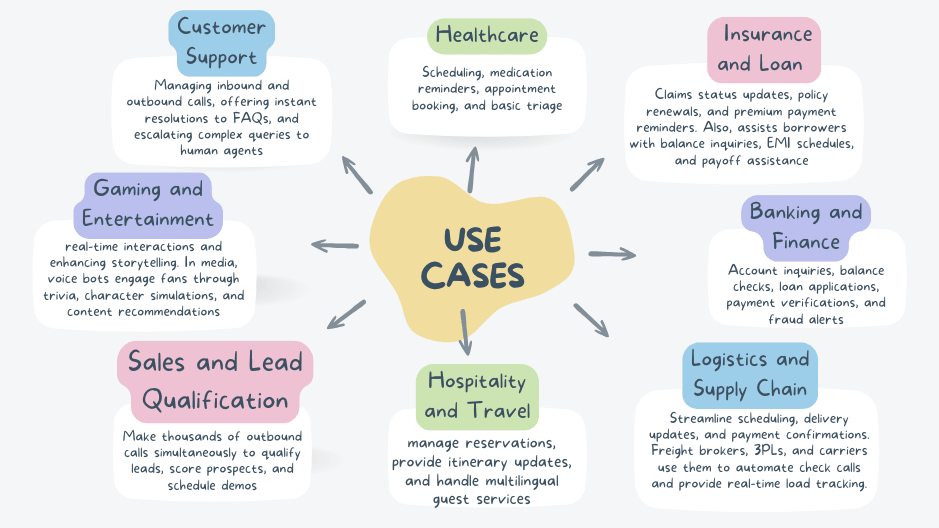
AI voice agents are transforming industries by automating routine interactions, personalizing customer experiences, and reducing operational load. Powered by advanced NLP, speech recognition, and machine learning, these agents are being adopted across sectors to drive efficiency and engagement. Here are the most impactful use cases of AI voice agents in 2026:
1. Customer Support Automation
AI voice agents are revolutionizing customer service by managing high volumes of inbound and outbound calls, offering instant resolutions to FAQs, and escalating complex queries to human agents.
Where is it Used?
- E-commerce, telecom, car dealerships, restaurants, field services
Benefits
- 24/7 availability
- Reduced wait times and support costs
- Multilingual and omnichannel support
- Consistent brand experience
2. Healthcare and Telemedicine
Voice AI is empowering healthcare providers with HIPAA-compliant automation tools for scheduling, medication reminders, appointment booking, and basic triage. It’s also being used for mental wellness support and patient education.
Where is it Used?
- Booking appointments via voice
- Automated reminders for prescriptions and follow-ups
- Conversational therapy and guided breathing for mental health
Benefits
- Improves patient adherence
- Reduces admin workload
- Enables accessible healthcare for all
3. Banking and Financial Services
AI voice agents in finance enable secure customer interactions for account inquiries, balance checks, loan applications, payment verifications, and fraud alerts without needing a live agent.
Where is it Used?
- Retail banking, mobile finance apps, credit unions
Benefits
- 24/7 access to financial services
- Reduced staffing costs
- Real-time alerts and personalized financial tips
- PCI-DSS and KYC-compliant automation
4. Insurance and Loan Servicing
Voice AI automates claims status updates, policy renewals, and premium payment reminders. In loan servicing, it assists borrowers with balance inquiries, EMI schedules, and payoff assistance.
Where is it Used?
- Natural conversations for policy queries
- Personalized loan product recommendations
Benefits
- Higher customer satisfaction
- Reduced manual handling of repetitive tasks
- Faster resolution of customer queries
5. Logistics and Supply Chain
AI voice agents in logistics streamline scheduling, delivery updates, and payment confirmations. Freight brokers, 3PLs, and carriers use them to automate check calls and provide real-time load tracking.
Benefits
- Automates repetitive logistics calls
- Enhances driver communication
- Reduces delays and errors in load coordination
6. Hospitality and Travel
Hotels, airlines, and travel companies use AI voice agents to manage reservations, provide itinerary updates, and handle multilingual guest services. From booking to concierge support, these agents enhance guest experiences.
Where is it Used?
- Voice-assisted check-ins/check-outs
- AI concierge for room service or event planning
Benefits
- Contactless experiences
- Real-time updates on bookings
- Multilingual, always-on customer care
7. Outbound Sales and Lead Qualification
AI voice agents make thousands of outbound calls simultaneously to qualify leads, score prospects, and schedule demos. They dynamically adjust tone based on sentiment and responses.
Where is it Used?
- CRM and sales platform integration
- Lead scoring and real-time analytics
Benefits
- Shortens sales cycles
- Increases outbound productivity
- Personalizes sales at scale
8. Gaming and Entertainment
AI voice agents in gaming act as dynamic NPCs, offering real-time interactions and enhancing storytelling. In media, voice bots engage fans through trivia, character simulations, and content recommendations.
Benefits
- Increased player immersion
- Personalized fan engagement
- Real-time event-based voice interactions
Whether it's handling support calls, scheduling appointments, or personalizing user experiences, AI voice agents are proving to be indispensable across domains. As natural language models and voice recognition technologies continue to evolve, the potential for AI voice agents will only expand; reshaping how businesses engage with users in real time.
Difference Between AI Voice Bots and Chatbots
While both technologies aim to improve user interactions through automation, the difference between AI voice bots and chatbots lies in how users engage; speech vs. text and in the platforms where they are deployed. Choosing between the two depends on your audience, use case, and desired interaction mode.
Why Do Customers Prefer Voice AI
Voice is the most natural interface for human communication and now, it is becoming the preferred way customers interact with brands. AI voice agents offer speed, simplicity, and seamlessness that text or click-based interfaces often lack.
Here’s why customers increasingly choose voice AI over traditional support channels
- No Menus to Navigate - Instead of clicking through complicated IVRs or endless web menus, users can just speak their request. Voice AI streamlines access to information and services instantly.
- No Waiting on Hold - With AI voice bots handling high volumes of requests in parallel, customers don’t need to queue for assistance. This ensures faster response times and 24/7 availability.
- No Repetition of Information - Modern voice AI agents retain context, which means customers don’t have to repeat their names, account numbers, or issues over and over again. This leads to frustration-free experiences.
- Human-Like, Conversational Experiences - Advancements in natural language processing (NLP) and voice user interface (VUI) design allow AI voice agents to sound more human, understand intent better, and even detect emotion building trust with users.
- Always-On Convenience - Whether it’s 2 PM or 2 AM, customers can engage with AI voice agents at their convenience. This 24/7 accessibility adds immense value, especially in global service environments.
- Growing User Trust - As voice technology improves, so does customer confidence. Today’s AI voice agents are far more accurate, responsive, and reliable making users more willing to engage without hesitation.
Note: Voice Feels Personal
Unlike forms or chatbots, voice interactions feel personal and engaging, allowing brands to build stronger emotional connections with users boosting satisfaction, loyalty, and retention.
In 2026 and beyond, as customers seek effortless, instant, and personalized support, it’s no surprise that voice AI is fast becoming the interface of choice.
For a closer look at the most advanced solutions in this space, read our breakdown of the Top AI Voice Agents of 2026.
Launch AI Voice Agents with Robylon

Looking for a fast, scalable way to automate voice-based customer interactions? Robylon's AI voice agent makes it simple to build and deploy intelligent AI voice agents without complex setup or costly dev time.
Why Choose Robylon Voice AI?
- Rapid deployment: Launch voice agents in hours using a no-code/low-code builder.
- Multilingual support: Speak your customer’s language with natural-sounding voices and local accents.
- Omnichannel readiness: Integrate with phones, websites, mobile apps, and smart assistants.
- Plug & play AI models: Connect with GPT-4, Claude, or Gemini to power dynamic conversations.
- Smart fallback: Seamlessly route complex queries to human agents in real time.
Easy Integration
- Connect your VoIP provider (Twilio, Plivo, etc.)
- Drag-and-drop workflows with built-in templates
- Integrate STT/TTS providers like ElevenLabs or Azure Speech
- Test, train, and go live in record time
Built for Growth-Focused Teams
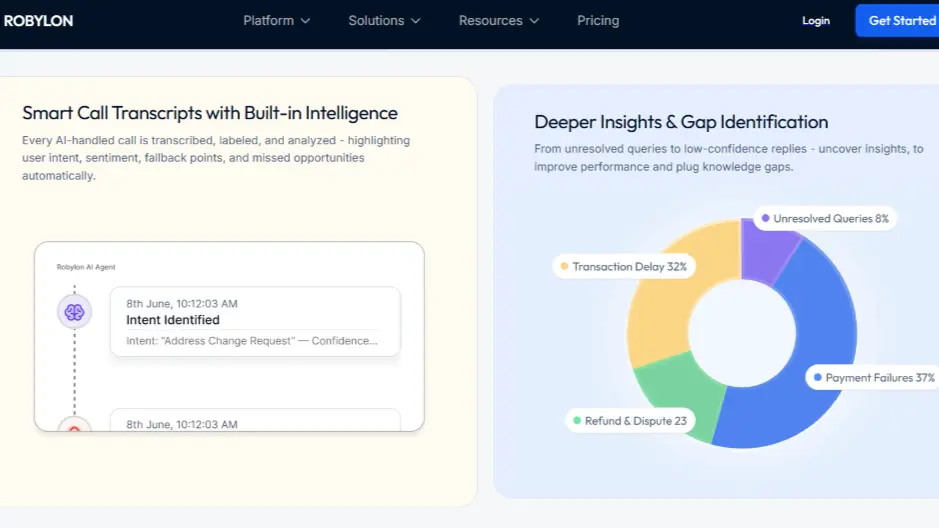
Robylon helps reduce support costs by up to 50%, improves CSAT by 30%, and ensures lightning-fast, consistent user experiences.
Ready to elevate your customer experience with voice-first automation?
Book a demo with Robylon and launch your AI voice agent today.
FAQs
What integrations are available (HubSpot, Salesforce, Zendesk/Freshdesk), and what gets logged automatically for voicebots?
Robylon AI integrates natively with HubSpot, Salesforce, Zendesk, Freshdesk, and telephony providers like Exotel. Each conversation is logged with call summaries, transcripts, and intent outcomes, ensuring sales and support teams have the context they need without manual entry.
How do you measure accuracy, CSAT lift, AHT reduction, and ROI of Voice Agents?
Voice Agent tracks intent recognition accuracy, resolution rates, and sentiment scores to benchmark performance. CSAT lift comes from shorter wait times and always-on support. AHT reduction is measured against historical human benchmarks. ROI is calculated by combining agent workload reduction with gains in conversion and retention.
Why do customers prefer voice AI over traditional support?
It’s faster, easier, and more natural with no hold times, no menus, and responses that feel like real conversations.
How fast can businesses deploy voice AI agents?
With tools like Robylon, companies can launch custom voice agents in hours using no-code builders and prebuilt integrations.
Are AI voice agents secure for banking and healthcare use?
Modern voice agents support voice biometrics and encryption, making them safe for handling sensitive data and compliant with privacy standards.
Can AI voice agents handle complex or emotional queries?
Yes, advanced voice agents use NLU and sentiment analysis to detect tone and intent, enabling more empathetic and adaptive responses.
What industries are using AI voice agents in 2026?
Agents are widely adopted in healthcare, banking, e-commerce, logistics, hospitality, and customer service for automating voice interactions at scale.
How are AI voice agents different from chatbots?
Voice agents use spoken input and output, while chatbots rely on text. They are better suited for phone-based and hands-free experiences.
What is an AI voice agent?
An AI voice agent is software that understands and responds to human speech in real time. It automates conversations using technologies like STT, NLP, and LLMs.





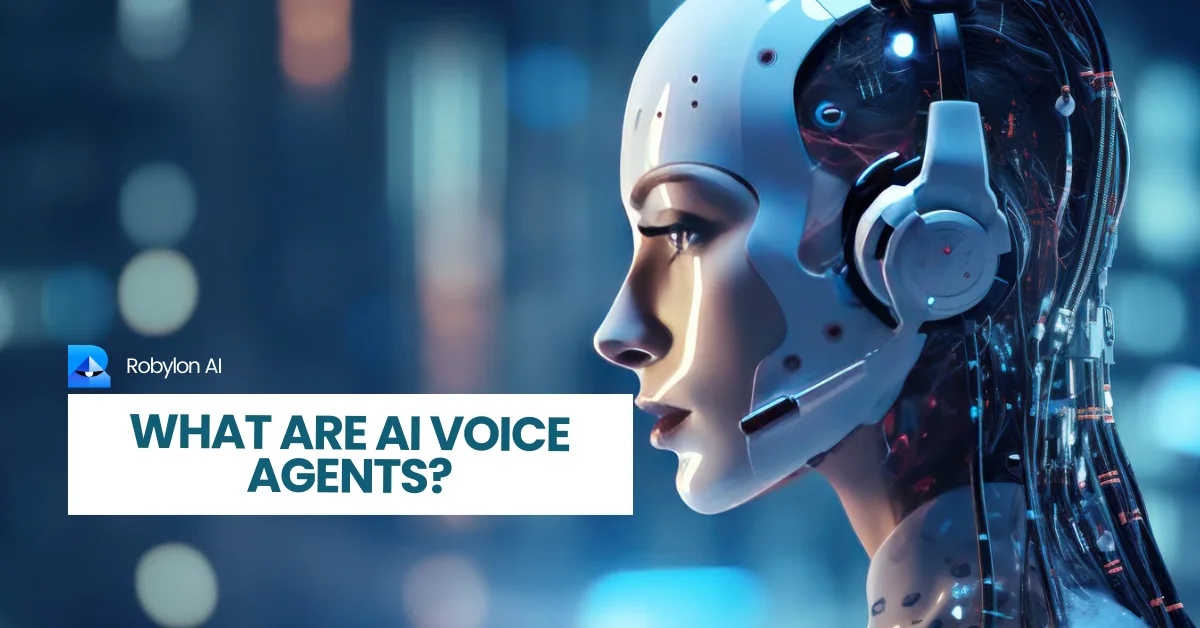
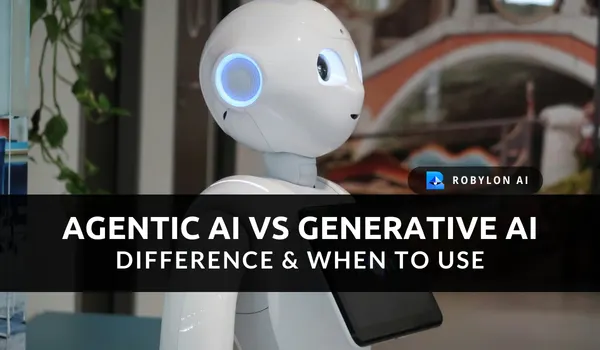
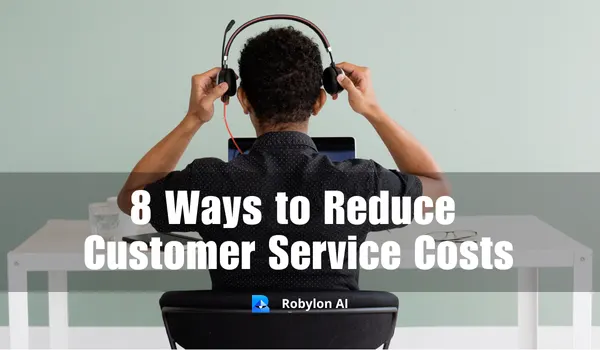

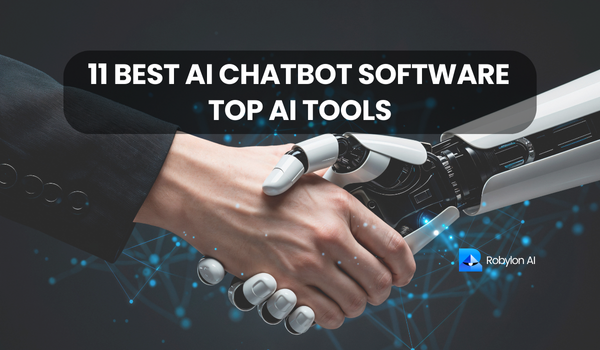
.png)
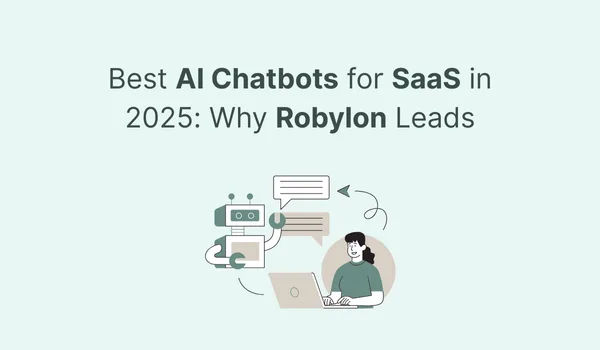
.webp)













